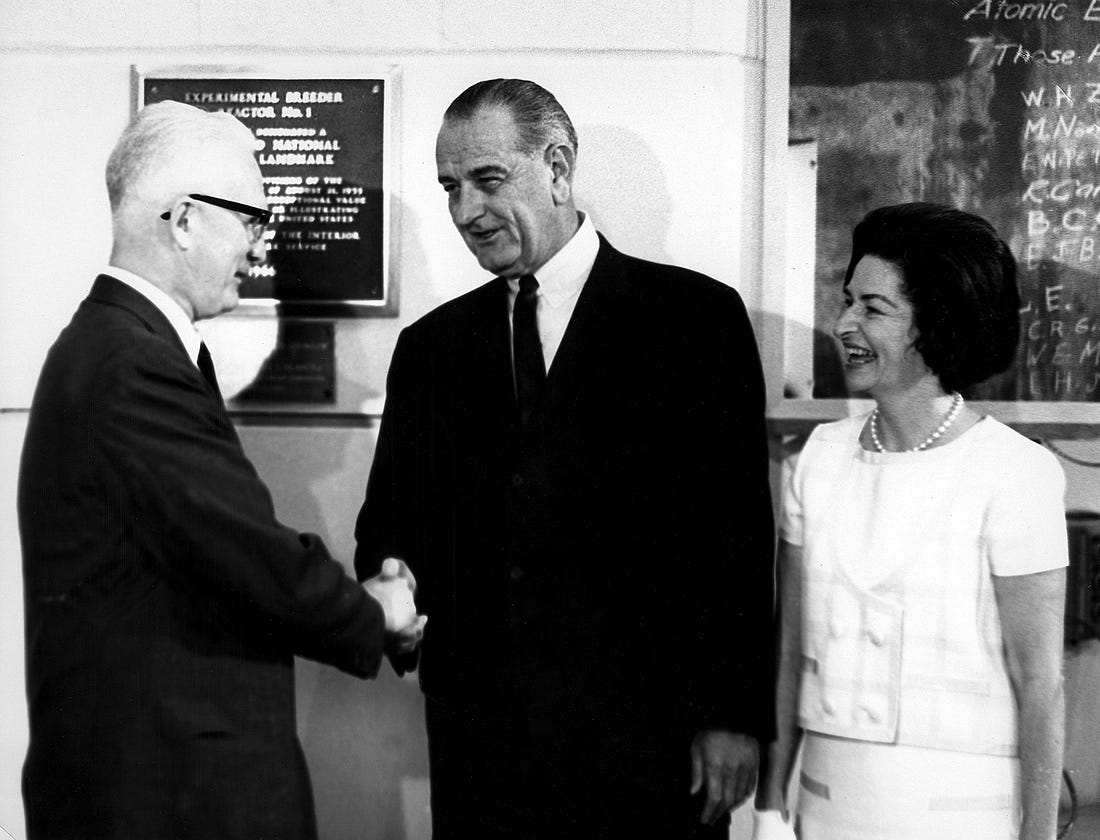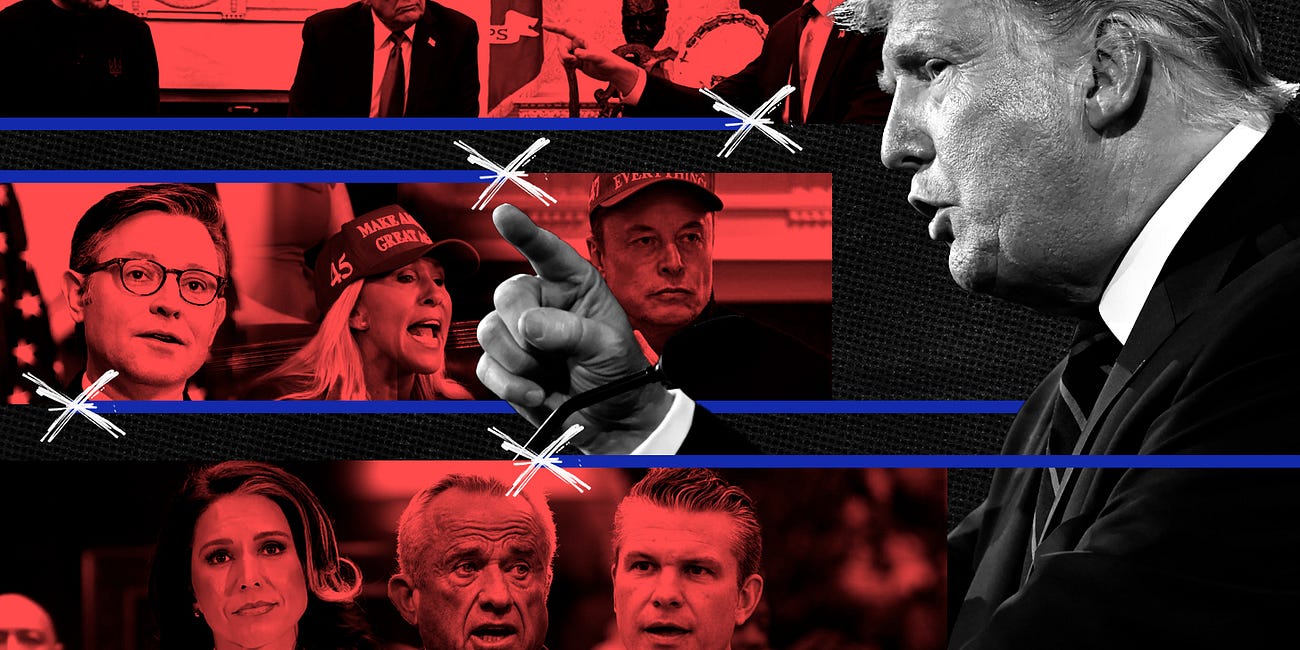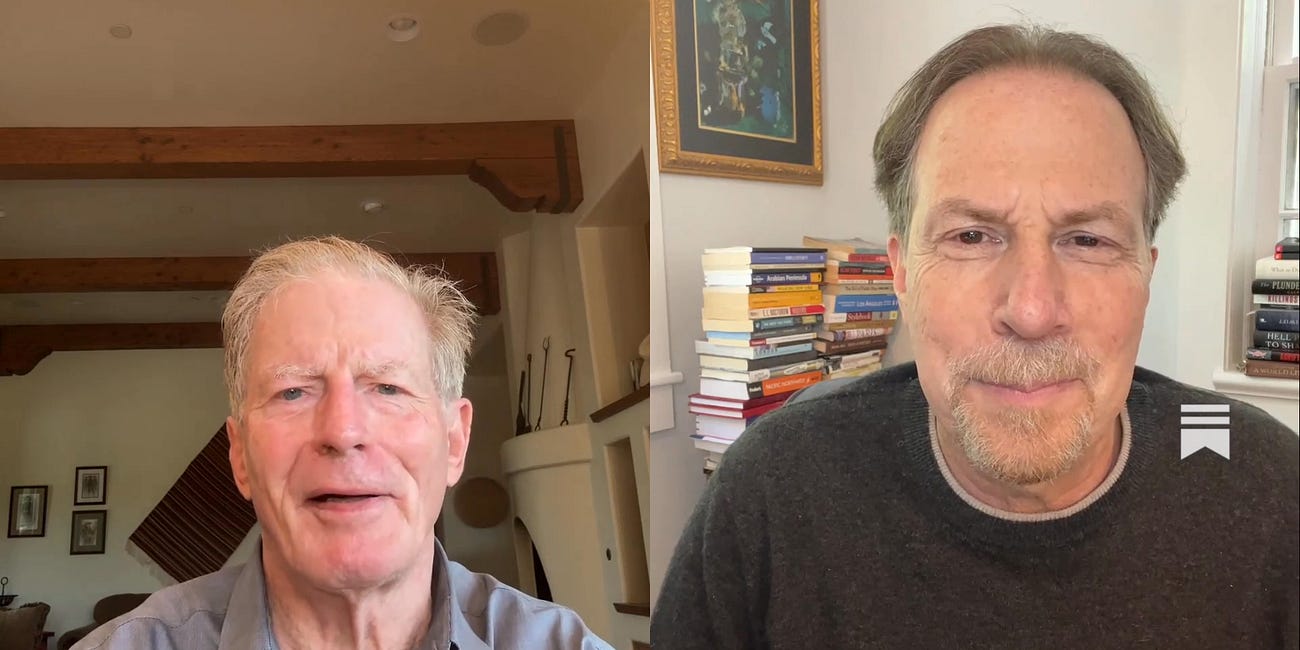|
 |
Thank you for being a free subscriber.. For all-access to Lincoln Square, and to help us amplify the content that you’re reading to Americans who aren’t paying attention, please consider upgrading your subscription today with this limited-time offer:
Hurry! offer ends soon!
Sixty Years Ago, LBJ Made the Case for the Kind of Nation Trump Is Trying to Destroy
In an extraordinary address at Howard University in June 1964, a President set forth a vision for an America that lives up to the ideals Jefferson enunciated in 1776.
Lyndon Johnson was not a great — not even a good — public speaker.
But on several occasions during the Long 1964 (which I define from the JFK assassination in November 1963 through the summer of 1965), he rose to the moment and made extraordinary commentaries on America’s hopes and history. One was his address to a joint session of Congress and the American people on Thanksgiving Eve, 1963. five days after the assassination had made him President. Another was his State of the Union Address in January 1964, in which he declared “unconditional war” on poverty and pledged that the civil rights bill would be enacted. A third was his May 1964 call for the creation of a “Great Society” at the University of Michigan.
The two LBJ speeches that stand out most, though, came in the spring of 1965. In the first, on March 15, eight days after the brutal police and mob attack on voting rights marchers in Selma, Johnson proposed the Voting Rights Act. He declared the horror at Selma to be “a turning point in man’s unending search for freedom.” “There is no Negro problem,” the President said. “There is no Southern problem. There is no Northern problem. There is only an American problem.” “Their cause must be our cause too,” he affirmed. “Because it is not just Negroes, but really it is all of us, who must overcome the crippling legacy of bigotry and injustice.” Then this southern Democrat paused before startling almost everyone by raising his arms and declaring: “And we shall overcome.”
On June 4, Johnson gave the commencement address at Howard University. Speaking to the graduates of the historically black university, he went farther in calling for the end to injustice and for the establishment of genuine equality than he ever had before.
He began the speech by talking of the centrality of revolution in the history of the United States. “Nothing,” the President declared, “is more freighted with meaning for our own destiny than the revolution of the Negro American. In far too many ways American Negroes have been another nation: deprived of freedom, crippled by hatred, the doors of opportunity closed to hope.”
In our time change has come to this Nation, too. The American Negro, acting with impressive restraint, has peacefully protested and marched, entered the courtrooms and the seats of government, demanding a justice that has long been denied. The voice of the Negro was the call to action. But it is a tribute to America that, once aroused, the courts and the Congress, the President and most of the people, have been the allies of progress.
The President said “The voting rights bill will be the latest, and among the most important, in a long series of victories” for expanding the American Promise of Freedom.
That beginning is freedom; and the barriers to that freedom are tumbling down. Freedom is the right to share, share fully and equally, in American society — to vote, to hold a job, to enter a public place, to go to school. It is the right to be treated in every part of our national life as a person equal in dignity and promise to all others.
‘Freedom Is Not Enough’
But, Johnson said, “freedom is not enough. You do not wipe away the scars of centuries by saying: Now you are free to go where you want, and do as you desire, and choose the leaders you please. You do not take a person who, for years, has been hobbled by chains and liberate him, bring him up to the starting line of a race and then say, "you are free to compete with all the others," and still justly believe that you have been completely fair.”
It was an extraordinary insight.
Thus it is not enough just to open the gates of opportunity. All our citizens must have the ability to walk through those gates.
This is the next and the more profound stage of the battle for civil rights. We seek not just freedom but opportunity. We seek not just legal equity but human ability, not just equality as a right and a theory but equality as a fact and equality as a result.
For the task is to give 20 million Negroes the same chance as every other American to learn and grow, to work and share in society, to develop their abilities — physical, mental and spiritual, and to pursue their individual happiness.
LBJ pointed out that “for the great majority of Negro Americans — the poor, the unemployed, the uprooted, and the dispossessed — there is a much grimmer story. They still, as we meet here tonight, are another nation. Despite the court orders and the laws, despite the legislative victories and the speeches, for them the walls are rising and the gulf is widening.” He listed striking statistics to support that point.
“These differences are not racial differences,” Johnson then declared.
They are solely and simply the consequence of ancient brutality, past injustice, and present prejudice. They are anguishing to observe. For the Negro they are a constant reminder of oppression. For the white they are a constant reminder of guilt. But they must be faced and they must be dealt with and they must be overcome, if we are ever to reach the time when the only difference between Negroes and whites is the color of their skin.
For these reasons, the descendants of enslaved Americans could not do it all on their own. Various immigrant groups “did not have the heritage of centuries to overcome, and they did not have a cultural tradition which had been twisted and battered by endless years of hatred and hopelessness, nor were they excluded—these others—because of race or color — a feeling whose dark intensity is matched by no other prejudice in our society.”
Johnson noted that the problems facing black Americans were “a seamless web. They cause each other. They result from each other. They reinforce each other.”
On and on the President of the United States went in his diagnosis:
Blighted hope breeds despair. Despair brings indifferences to the learning which offers a way out. And despair, coupled with indifferences, is often the source of destructive rebellion against the fabric of society.
There is also the lacerating hurt of early collision with white hatred or prejudice, distaste or condescension.
Then he mentioned his own formative experience teaching in a school in south Texas: “I have seen this uncomprehending pain in the eyes of the little, young Mexican-American schoolchildren that I taught many years ago. But it can be overcome. But, for many, the wounds are always open.”
He pointed to the breakdown in family structure. “It flows from centuries of oppression and persecution of the Negro man. It flows from the long years of degradation and discrimination, which have attacked his dignity and assaulted his ability to produce for his family.”
‘To Fulfill These Rights’
[Our] object will be to help the American Negro fulfill the rights which, after the long time of injustice, he is finally about to secure.
To move beyond opportunity to achievement.
To shatter forever not only the barriers of law and public practice, but the walls which bound the condition of many by the color of his skin.
To dissolve, as best we can, the antique enmities of the heart which diminish the holder, divide the great democracy, and do wrong — great wrong — to the children of God.
And I pledge you tonight that this will be a chief goal of my administration, and of my program next year, and in the years to come. And I hope, and I pray, and I believe, it will be a part of the program of all America.
“So,” the President concluded sixty years ago,
… it is the glorious opportunity of this generation to end the one huge wrong of the American Nation and, in so doing, to find America for ourselves, with the same immense thrill of discovery which gripped those who first began to realize that here, at last, was a home for freedom.
All it will take is for all of us to understand what this country is and what this country must become.
The Scripture promises: "I shall light a candle of understanding in thine heart, which shall not be put out."
Together, and with millions more, we can light that candle of understanding in the heart of all America.And, once lit, it will never again go out.
LBJ’s words on June 4 six decades ago were even more startling and radical and full of idealistic promise than what he had said in his voting rights speech in March. They speak to what might have been after all that began in 1964 and indicated how great the potential for a better America was before Watts and the major escalation of the war in Vietnam.
And those words point to a radically different America from that the Trump Regime is trying to bring about, an America united by a belief in freedom, equality, and dignity for everyone—a truly great America.
Donald Trump and his fascist movement are doing all they can to extinguish the “light of understanding in the heart of all America” that Lyndon Johnson called for.
We must not let them get away with it.
Author and historian Robert S. McElvaine writes the Musings & Amusings Substack. Read the original column here.
NOTE: This is the nineteenth in a series of essays, “The Long 1964 at Sixty,” McElvaine is writing on what was happening in extended year 1964, “The Year ‘The Sixties’ Arrived and the Battle Lines of Today Were Drawn,” as he put it in the subtitle of his most recent book, The Times They Were a-Changin.’
You’re currently a free subscriber to Lincoln Square Media. For full access to our content, our Lincoln Loyal community, and to help us amplify the facts about the assault on our rights and freedoms, please consider upgrading your subscription today with this limited-time offer:



